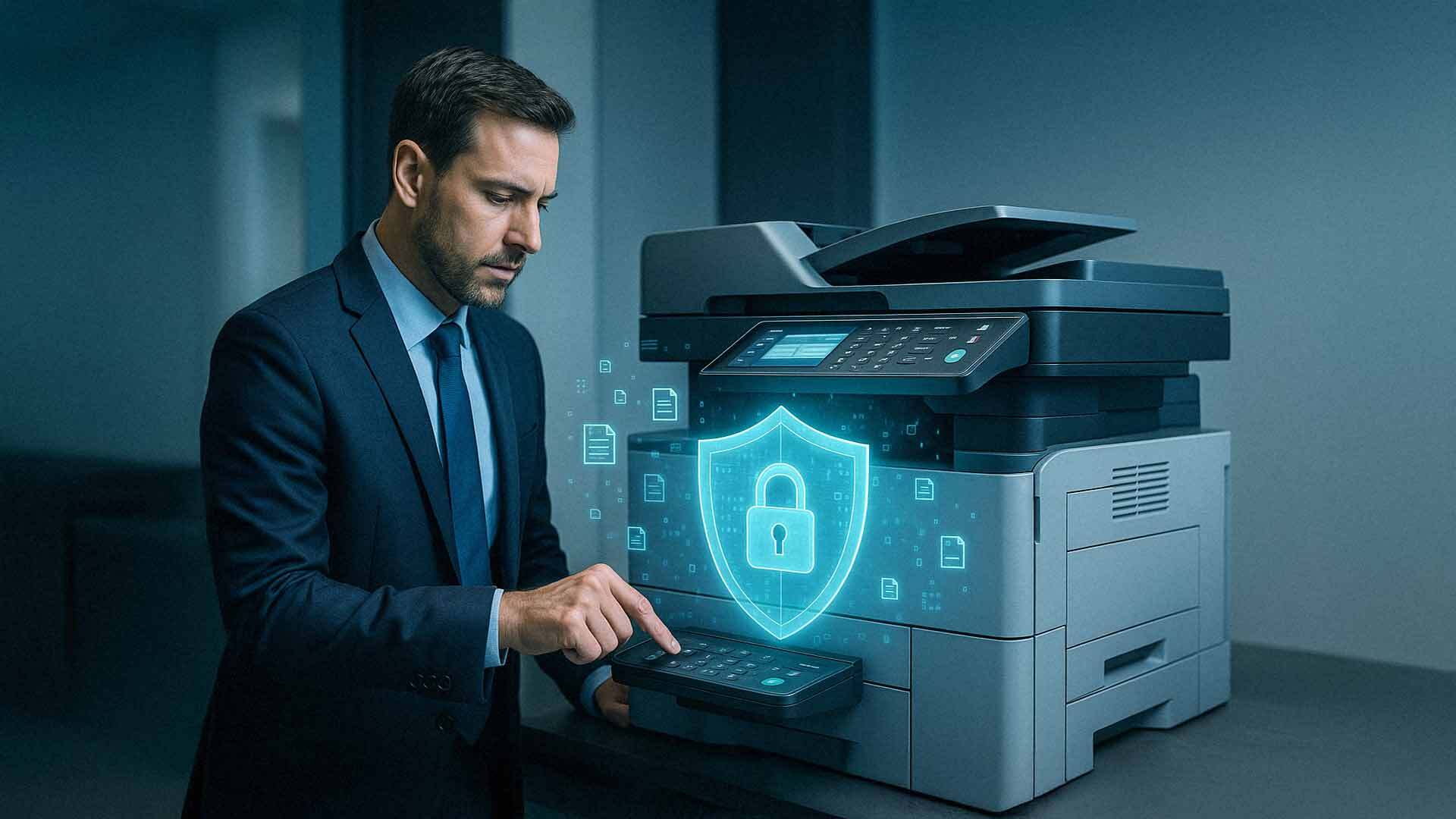How to Protect Sensitive Data Stored on Your Office Copiers
August 14th, 2025 | 4 min. read

When most people think about office technology security, they picture firewalls, antivirus software, and encrypted email.
What often gets overlooked is the copier in the corner, a powerful piece of equipment that stores and processes large amounts of sensitive business data.
Modern copiers are specialized computers with storage drives, operating systems, and network connections.
This means they carry many of the same risks as your laptops and servers. If not secured, they can be a target for data theft.
Why Office Copiers Store Data
How Modern Copiers Function Like Computers
Today’s multifunction copiers are designed to scan, print, copy, and fax documents with ease. To do this, they temporarily store digital copies of documents on an internal hard drive or solid-state drive.
This storage allows the machine to manage large print jobs, queue tasks, and send scanned files to email or shared folders.
What Types of Data Are Stored
Depending on how your copier is used, its storage may hold:
- Copies of printed or scanned documents
- Email addresses and contact lists
- Network credentials for shared folders
- Fax logs and stored faxes
If these files contain customer information, financial data, or confidential business records, they become a valuable target for cybercriminals.
The Security Risks of Unprotected Copiers
Unauthorized Access to Stored Documents
Anyone with physical or network access to your copier could retrieve stored files if security features are not enabled.
Data Theft During Copier Disposal or Lease Returns
When a copier lease ends or a device is replaced, the hard drive often goes back to the vendor or into storage. If the data is not wiped, sensitive documents could be recovered by the next person who uses or services the machine.
Cybersecurity Threats via Network-Connected Devices
Because most copiers connect to your network, they can serve as a pathway for hackers. If the copier’s software is outdated or its network settings are insecure, it can be exploited like any other vulnerable endpoint.
Steps to Protect Data on Office Copiers
Enable Data Encryption on the Copier’s Hard Drive
Most modern copiers offer built-in encryption to protect stored documents. Make sure this feature is enabled and configured correctly.
Encryption ensures that even if someone removes the hard drive, they cannot read the data without the encryption key.
Use Secure Print Release Features
Secure print release requires employees to enter a PIN or swipe a badge at the copier before documents are printed. This prevents sensitive files from being left in the output tray where anyone could pick them up.
Regularly Update Copier Firmware
Manufacturers release firmware updates to patch security vulnerabilities. Schedule regular updates to keep your copier protected against known threats.
Limit and Manage User Access
Restrict copier access to authorized users and set permissions based on job roles. For example, only certain staff members might be allowed to scan to external email addresses.
Implement Hard Drive Wiping or Overwriting Policies
Configure the copier to overwrite stored data after each job automatically. For devices that keep longer-term storage, set a schedule to wipe the hard drive securely.
How to Secure Copiers on Your Network
Use Firewalls and Network Segmentation
Place copiers on a separate network segment from your critical business systems. This limits potential damage if the copier is compromised.
Disable Unnecessary Network Protocols
Turn off unused features like FTP, Telnet, or older printing protocols that could be exploited.
Monitor Copier Activity with Audit Logs
Many copiers can log activity such as print jobs, scans, and login attempts. Reviewing these logs regularly can help detect unusual activity.
What to Do Before Returning or Disposing of a Copier
Remove or Wipe the Hard Drive
Before sending a copier back to the vendor or recycling it, remove the hard drive or perform a complete data wipe. Many vendors offer this service, but you should confirm it is done properly.
Get Written Proof of Data Destruction from Vendors
If a third party handles the drive wiping, request documentation that certifies the data was securely destroyed according to industry standards.
Training Employees on Copier Security
Teaching Staff About Secure Printing and Scanning
Show employees how to use secure print release, scan to secure folders, and avoid sending sensitive data through unsecured channels.
Creating Simple Security Guidelines for Everyday Use
Post easy-to-follow instructions near each copier so staff remember to log out after use, retrieve documents promptly, and report any unusual copier behavior.
Protecting Sensitive Data on Your Office Copiers: Final Recommendations
Office copiers are an often-overlooked part of your security strategy, yet they store and process some of your most sensitive information.
By enabling encryption, using secure print features, keeping firmware up to date, and training employees, you can significantly reduce the risk of a data breach.
At AIS, we help businesses in Las Vegas and Southern California secure their office technology through managed print services and document security solutions.
We ensure your devices meet both your productivity and security needs.
A true southerner from Atlanta, Georgia, Marissa has always had a strong passion for writing and storytelling. She moved out west in 2018 where she became an expert on all things business technology-related as the Content Producer at AIS. Coupled with her knowledge of SEO best practices, she's been integral in catapulting AIS to the digital forefront of the industry. In her free time, she enjoys sipping wine and hanging out with her rescue-dog, WIllow. Basically, she loves wine and dogs, but not whiny dogs.
Topics:



